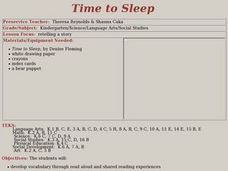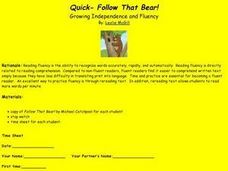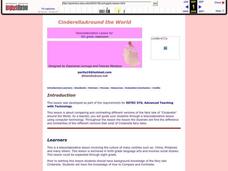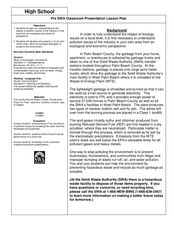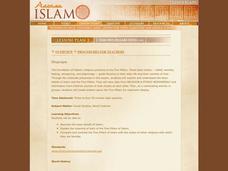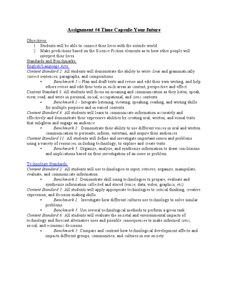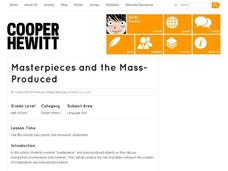Curated OER
Time to Sleep
Students develop vocabulary and retell a story that they have just listened to.
Curated OER
Monitor and Clarify Unknown Words in Corgiville Fair
Students identify unknown words and select a strategy to comprehend text. In this vocabulary lesson students listen for specific words as the teacher reads. Students try to figure out what the meaning of the specific words are. The words...
Curated OER
Reading Food Labels
Students investigate the concept of phonemic awareness in order to help increase reading comprehension. The reading of food labels creates the context for the practice session. They pay particular attention to certain sounds that must be...
Curated OER
Quick - Follow That Bear!
Students examine the importance of speaking with fluency and expression. They listen to the teacher modeling fluent, smooth reading and choppy reading. The students read "Follow That Bear!" orally, and practice reading it quickly and...
Curated OER
True or False Body Parts
In this picture and word comprehension instructional activity, students examine 7 pictures of body parts. Students read the question and from 4 choices, select the correct answer.
Curated OER
ELD with Dr. Seuss Will Turn Their Creativity Loose!
Use the timeless story of Green Eggs and Ham to excite learners of all ages and proficiency levels.
Agriculture in the Classroom
Seed Match
Using this resource, your team of green thumbs discuss why plants are a part of a healthy diet and the different ways they are used in daily life. They then observe the characteristics of different seed as they attempt to match...
Curated OER
Cinderella Around the World
Fourth graders compare and contrast different versions of the fairy tale of "Cinderella" around the World. They find the difference and similarities of the different versions that exist of Cinderella fairy tales.
Museum of Tolerance
Cultural Research Activity
Class members explore cultural diversity through a variety of texts that showcase the importance of traditions. Then, they interview their family members to research their own cultural background and write their findings on quilt...
Curated OER
All Hats for Ecology: Solid Waste Presentation
Students investigate community issues with solid waste. In this mock trial lesson, students examine the issues of solid waste from an ecological and economical perspective. They will develop a mock trial which encourages preservation of...
Curated OER
The Five Pillars of Islam
In order to better understand Muslim civilization, culture, and politics one must first familiarize themselves on the 5 Pillars of Islam, ideas which dominate much of Muslim societal and cultural norms. Provide your learners with a...
Curated OER
Dollars and Sense
Fourth graders read "Starting a Business" and answer the question: "How could you design an ad to let the community know about the business described in the story?" Then, they illustrate a written ad that could be posted in the...
Museum of Tolerance
Oral History Activity
Oral history has brought a multitude of lessons, stories, and factoids to our current knowledge of the past. Let us continue to use oral history traditions through a lesson that encourages pupils to discover and appreciate...
Museum of Tolerance
Artifact Research Activity
Artifacts give us the privilege of learning about the past, may it be family, culture, or traditions. Here, class members learn about their family's past with the help of an artifact, or family heirloom. Once an artifact is...
Curated OER
Where in the World is the Wide Web?
Sixth graders investigate how the web works and how to search effectively. In this Internet use lesson, 6th graders brainstorm positive and negative experiences they have had while on the Internet. Students view two web sites to learn...
Curated OER
Water Fun
Students examine uses for water. In this water lesson, students discuss how they use water. As a class students make a PowerPoint by naming one swimming safety rule. Students compare and contrast fishing for fun and fishing for survival.
Lerner Publishing
Living or Nonliving
It's alive! Or is it? Through a series of shared readings, whole class activities, and independent exercises children explore the difference between living and non-living things, creating a pair of printable books...
Library of Congress
Stars, Stripes and Symbols of America: Comparing Our Flag, Past and Present
Your young historians will compare and contrast the details of the American flag today with an an image of the nation's flag from the post-Civil War era, and identify the flag's importance as a national symbol through analysis...
Lerner Publishing
Teaching Habitats
What makes up a habitat? Use this resource to engage first graders in the exploration of desert, wetland, forest, and ocean habitats. Youngsters classify plants and animals into the four distinct habitats through drawings and cutting and...
Curated OER
Unit Plan for The Catcher in the Rye —A “Place-Based” Approach
"People never notice anything." As part of their study of The Catcher in the Rye, class members adopt Holden Caulfield's approach and spend time as quiet observers of their surrounding, recording their observations/reflections in a...
Curated OER
Assignment #4 Time Capsule-Your Future
Class members create a PowerPoint presentation showing artifacts they would include in a time capsule. The artifacts and explanations reflect personal hobbies, grooming choices, school life, etc. A great way for class members to...
Curated OER
Masterpieces and the Mass-Produced
Students examine "masterpieces" and mass-produced objects as they discuss humankind's inventiveness and creativity. They also analyze the role of problem solving in the creation of masterpieces and mass-produced items.
Museum of Tolerance
Family Tree Activity
Discover the family histories that make the classroom with a family tree activity. Scholars locate information about their family, construct a family tree, and work together to tally where family members are born.
Museum of Tolerance
Just What Kind of American Are You?
Your parents were both in different countries. You were born in the US. Documents and application forms ask you to identify your racial or ethnic classification. Which box do you check? Class members collect documents...
Other popular searches
- Speaking and Listening
- Speaking and Listening Skills
- Esl Speaking and Listening
- Listening, Speaking Skills
- Listening and Speaking Abroad
- Listening Speaking Viewing
- Listening Speaking and Viewing
- Ks2 Speaking and Listening
- Listening Speaking Skills
- Speaking Listening Esl
- Speaking Listening
- Listening, Speaking, Viewing
